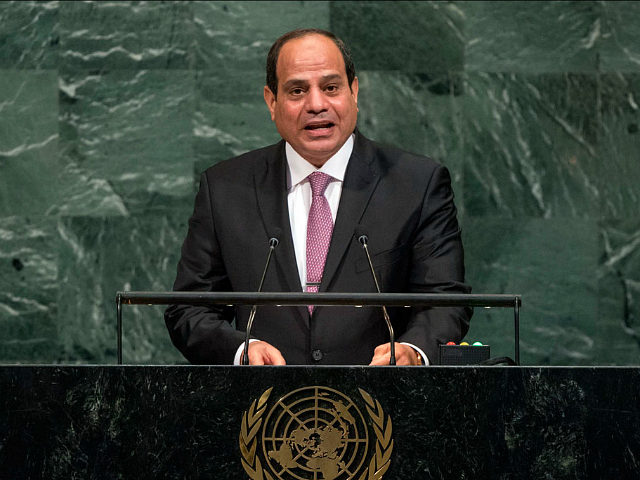During his address to the United Nations General Assembly on Tuesday, Egyptian President Abdel Fattah al-Sisi departed from his prepared remarks to plead for peace between the Palestinians and Israel.
Sisi said it was extremely important for the Palestinian people to “overcome their differences, and not to lose opportunities, and to be ready to accept coexistence with the other, with Israelis, in safety and security.”
“We have an excellent experience in Egypt in peace with you for longer than 40 years,” Sisi said to Israel. “We can repeat this experience and this excellent step once again – the peace and security of the Israeli citizens together with the peace and security of the Palestinian citizens.”
Sisi had a meeting with Israeli Prime Minister Benjamin Netanyahu in New York on Monday, marking the first joint public appearance of the two leaders, although they have “met twice secretly in 2016 and speak on the phone periodically,” according to the Jerusalem Post.
During his meeting with Netanyahu, Sisi reportedly expressed a desire to become more involved in reconciling the two major factions of the Palestinians, Fatah and Hamas, and “assist efforts to achieve peace between Israel and the Palestinians and the region.”
For their part, the Palestinians are said to be looking to Sisi as a broker to get the “two-state solution” moving again, mindful that Egypt has both strategic reasons to resolve the Israeli-Palestinian conflict (i.e. apprehension over Iran’s regional ambitions) and pragmatic reasons for doing so (violence in the Gaza Strip).
Egypt is also in a delicate political situation since it famously maintains diplomatic relations with Israel, but younger Egyptians identify strongly with the Palestinians.
Sisi spoke up for the “Palestinian cause” during his prepared remarks to the U.N. General Assembly, calling for a “just settlement, based on established international norms and principles” that would establish “an independent Palestinian state along the 1967 borders with East Jerusalem as its capital.”
“Undoubtedly, achieving peace will eliminate one of the main excuses terrorism has been manipulating to justify its proliferation in the region,” he argued. “It is time to permanently overcome the barrier of hatred forever.”
Sisi spoke at length about terrorism and religious extremism, taking note of Egypt’s “unrelenting battle to eradicate terrorism from its territory.”
“We in the Muslim world need to face our reality and work together to rectify misconstrued notions which have become an ideological pretext for terrorists and their destructive discourse,” he said.
Egypt’s president also addressed the situation in Syria where he called for “a consensual political solution amongst all Syrians, at the core of which is the preservation of the unity of the Syrian state, the maintenance of its institutions, and the broadening of their political and social base to include all factions of the Syrian society, and to decisively counterterrorism until it is defeated.”
He said Egypt rejects “any attempt to manipulate the tragedy in Syria to establish international or region zones of influence or to carry out the subversive policies of some regional parties, whose practices have caused great suffering in our region over the past few years.”
Sisi likewise called for reconciliation in war-torn Libya. “Here, I would like to emphasize very clearly that Egypt will not allow the continuation of attempts to tamper with the unity and integrity of the Libyan state, or to undermine the capabilities of the Libyan people,” he said, alluding to a similar Egyptian stance on the civil war in Yemen.
He did not specify precisely which actors he sees as manipulating the Syrian, Libyan, or Yemeni civil wars in this manner, but it’s not hard to think of a few likely suspects.
Interestingly, Sisi concluded his speech by addressing the situation in Myanmar.
“The humanitarian tragedy facing the Rohingya minority in Myanmar represents another reason to remind the international community of its moral obligations, let alone its legal responsibilities, as reflected in the U.N. Charter, to promptly work towards a lasting solution that ends the plight of civilians and addresses the root cause of the crisis, which has become a threat to regional security and the stability of neighboring countries,” said Sisi.

COMMENTS
Please let us know if you're having issues with commenting.